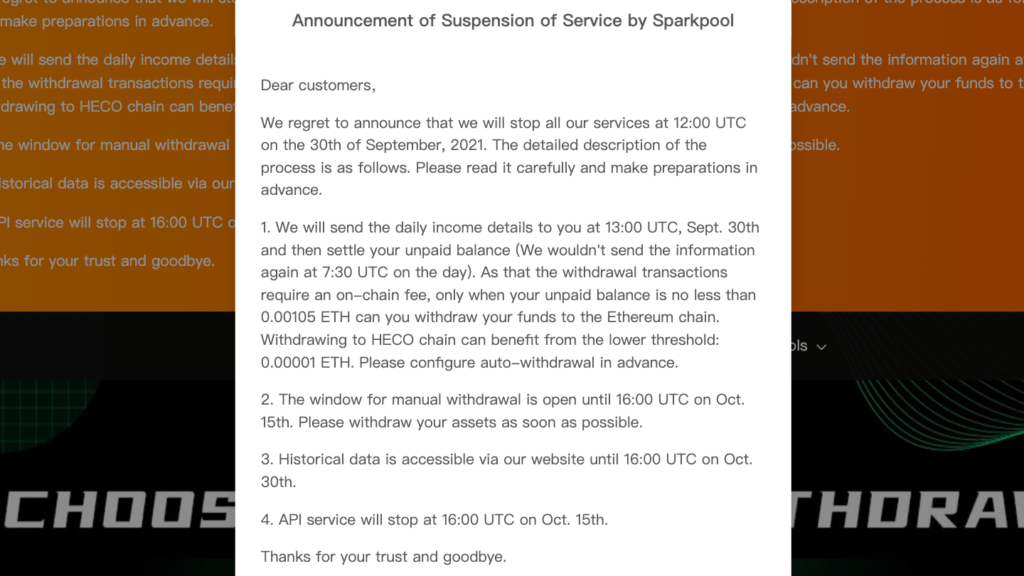Ethereum mining pools killed by China’s cryptocurrency crackdown

Two of the world’s largest Ethereum mining pools — Sparkpool and BeePool — confirmed plans to shutter operations in response to China’s ongoing clampdown of cryptocurrency miners.
BeePool, which ranked fourth in the Ether mining leaderboard, announced the news Tuesday via Twitter. The China-based company intends to close up shop by mid-October.
A pop-up on the BeePool homepage relayed a similar message. “Dear users, according to the latest regulations, BeePool is implementing the following measures for an orderly exit,” reads the notice.
“Thanks for your consistent support on BeePool over the past four years. Goodbye!”
Sparkpool, the second-largest Ethereum mining pool, posted a similar note.
The Hangzhou-based company had originally stopped providing services to new users in China as of September 24.
However, services to all users would be suspended by Thursday (September 30). Sparkpool advised participants to claim their Ether reward balance by October 15.
Ethereum’s hash rate dropped up to 5% following the BeePool and Sparkpool announcements, according to YCharts, but has since rebounded slightly.
China also ousted crypto exchanges
Mining pools allow smaller operations or individuals to join forces with others around the world.
Combining computer power with other Ethereum miners means smaller rigs can compete with large data centers. As a result, each contributor takes a cut of rewards gleaned by validating transactions.
The latest moves by BeePool and Sparkpool follow a notice from the People’s Bank of China (PBoC), which took action against all businesses involved with unofficial digital money.
Last Friday, the PBoC reiterated the illegality of all cryptocurrency-related activity. China proceeded to ban overseas crypto enterprises from servicing Chinese nationals.
In fact, 10 Chinese authorities — including PBoC and the Central Cyberspace Administration of China — will form a “coordination mechanism” to root out illegal crypto operations.
Crypto exchanges quickly pivoted to avoid a fight with the law. Huobi, and OKCoin suspended Chinese customers, while Binance pretended it hasn’t serviced netizens since 2017.
Ethereum, Bitcoin mining faces increased surveillance
Chinese crypto proponents can expect enforcement at the local level as well as strengthened surveillance and monitoring.
The central government said it would establish a “multi-level” crypto speculation and “risk prevention” disposal system to get rid of offending websites and apps.
But smaller operations of 100 miners or less were reportedly managing to fly under the radar. In response, the government threatened the region with internet blackouts to root out illicit operations.

[Read more: Binance claims it has no crypto exchange business in China — that’s a lie]
Now, tech companies in the northern region of Hebei have until Thursday (September 30) to self-certify that they aren’t running illegal mining rigs.
Meanwhile, the PBoC has been testing a digital yuan in preparation for a February 2022 launch.
So, it’s likely this crackdown on decentralized entities is Beijing’s plan to push the public towards a central bank digital currency.
Follow us on Twitter for more informed crypto news.
